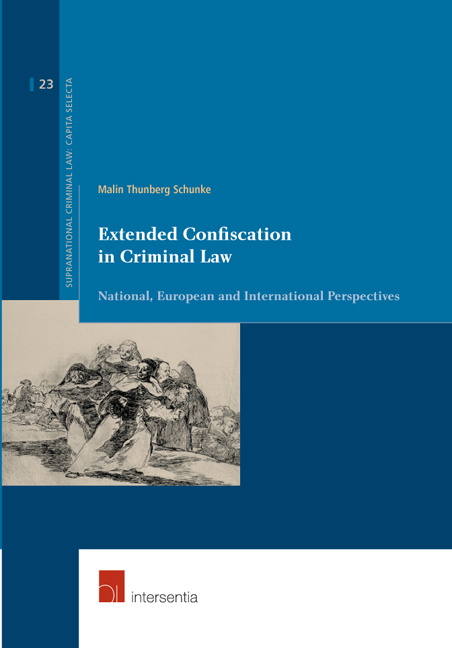Book contents
- Frontmatter
- Preface
- Contents
- Table of Cases
- List of Abbreviations
- Part I Introduction
- Part II Substantive Provisions on Extended Confiscation
- Chapter 2 Legislative Action by the EU
- Chapter 3 Legislation in England and Wales
- Chapter 4 Legislation in Germany
- Chapter 5 Legislation in Sweden
- Chapter 6 Brief Overview of the Legislation in Norway, Denmark and Finland
- Chapter 7 Directive 2014/42/EU: A Reform with Significant Legal Changes?
- Part III The Legal Framework for International Cooperation
- Bibliography
- Index
- About the Author
Chapter 2 - Legislative Action by the EU
from Part II - Substantive Provisions on Extended Confiscation
Published online by Cambridge University Press: 11 October 2018
- Frontmatter
- Preface
- Contents
- Table of Cases
- List of Abbreviations
- Part I Introduction
- Part II Substantive Provisions on Extended Confiscation
- Chapter 2 Legislative Action by the EU
- Chapter 3 Legislation in England and Wales
- Chapter 4 Legislation in Germany
- Chapter 5 Legislation in Sweden
- Chapter 6 Brief Overview of the Legislation in Norway, Denmark and Finland
- Chapter 7 Directive 2014/42/EU: A Reform with Significant Legal Changes?
- Part III The Legal Framework for International Cooperation
- Bibliography
- Index
- About the Author
Summary
FD 2005/212/JHA
INTRODUCTION
As described in Section 1.2 above, the EU has adopted several instruments in the area of confiscation and asset recovery. In the context of this study, FD 2005/212/ JHA is especially important as it introduced a system of extended confiscation into the EU regime. The last date for the national implementation of this framework decision was 15 March 2007. At present, all Member States except for Greece, Italy, Luxembourg and the United Kingdom have implemented it. In some of the States which have not implemented the instrument the measure of extended confiscation is provided for anyway (one example is the UK), and in other States the implementation process is ongoing. In the following, the most central provisions of FD 2005/212/JHA are presented. Thereafter the reviews of the European confiscation powers in the years 2005 – 2014 are described (Section 2.2). The chapter closes with a presentation of the new directive adopted within the EU in 2014 (Section 2.3).
The aim of FD 2005/212/JHA has been to harmonise national confiscation laws, and to ensure that all Member States have effective rules. At its adoption, the EU legislator argued that the existing instruments in the area of confiscation had neither to a sufficient extent achieved powerful confiscation measures nor more effective routines for cross-border cooperation. This was considered to be due to certain differences between the domestic legislation, and also as resulting from the poor implementation rates regarding the existing instruments. Article 2 FD 2005/212/JHA deals with the powers of ordinary confiscation. This form of confiscation requires that a link is proved between a specific criminal offence and the assets to be confiscated. The Member States are obligated by this provision to enable their authorities to confiscate, either wholly or in part, instrumentalities and proceeds from criminal offences punishable by deprivation of liberty for more than one year, or property the value of which corresponds to such proceeds. An exception is made for tax offences, where the Member States are permitted to use procedures other than criminal procedures to deprive the perpetrator of the proceeds of such an offence.
- Type
- Chapter
- Information
- Extended Confiscation in Criminal LawNational, European and International Perspectives, pp. 25 - 42Publisher: IntersentiaPrint publication year: 2017



